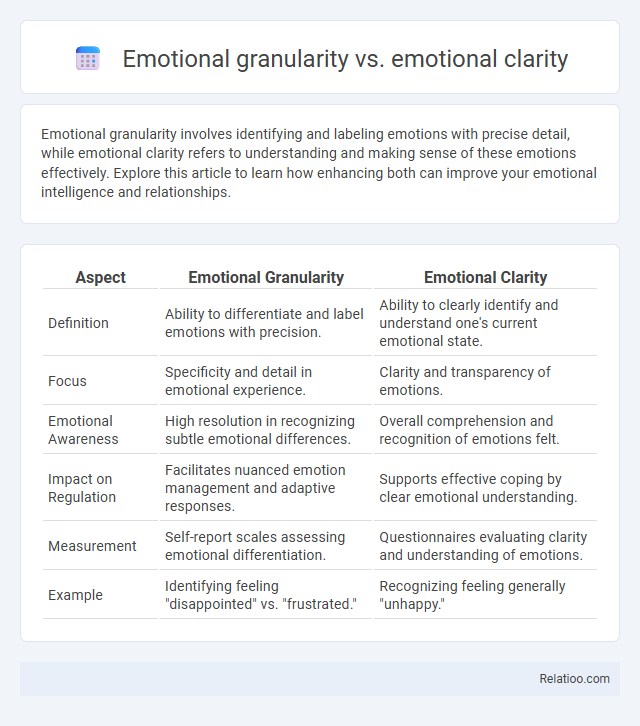Emotional granularity involves identifying and labeling emotions with precise detail, while emotional clarity refers to understanding and making sense of these emotions effectively. Explore this article to learn how enhancing both can improve your emotional intelligence and relationships.
Table of Comparison
| Aspect | Emotional Granularity | Emotional Clarity |
|---|---|---|
| Definition | Ability to differentiate and label emotions with precision. | Ability to clearly identify and understand one's current emotional state. |
| Focus | Specificity and detail in emotional experience. | Clarity and transparency of emotions. |
| Emotional Awareness | High resolution in recognizing subtle emotional differences. | Overall comprehension and recognition of emotions felt. |
| Impact on Regulation | Facilitates nuanced emotion management and adaptive responses. | Supports effective coping by clear emotional understanding. |
| Measurement | Self-report scales assessing emotional differentiation. | Questionnaires evaluating clarity and understanding of emotions. |
| Example | Identifying feeling "disappointed" vs. "frustrated." | Recognizing feeling generally "unhappy." |
Understanding Emotional Granularity
Understanding Emotional Granularity involves recognizing the precise and nuanced differences between your emotions, which enhances your ability to manage and respond to them effectively. Emotional clarity refers to how clearly you can identify and label your feelings, while emotional granularity takes this further by emphasizing the fine distinctions within those emotions. Higher emotional granularity improves emotional regulation, mental health, and interpersonal communication by helping you articulate your experiences with greater specificity.
Defining Emotional Clarity
Emotional clarity involves the ability to accurately identify and understand your emotions, enabling effective emotional regulation and decision-making. While emotional granularity refers to the detailed differentiation between similar emotions, emotional clarity emphasizes clear recognition without confusion or blending of feelings. Developing emotional clarity enhances your self-awareness and promotes healthier interpersonal relationships by providing a solid foundation for emotional insight.
Emotional Granularity vs Emotional Clarity: Key Differences
Emotional granularity refers to the ability to identify and differentiate between complex emotions with precision, while emotional clarity involves understanding and making sense of one's emotional states. Key differences lie in granularity's emphasis on categorizing emotions into finer distinctions and clarity's focus on comprehending and labeling emotions accurately. Research indicates that higher emotional granularity enhances emotional regulation and coping strategies, whereas emotional clarity primarily supports emotional awareness and reduces distress.
The Psychology Behind Emotional Granularity
Emotional granularity refers to the ability to identify and differentiate between subtle emotions, enhancing emotional regulation and mental health. Emotional clarity, on the other hand, involves understanding the causes and meanings of your feelings, which is crucial for effective decision-making and coping strategies. The psychology behind emotional granularity highlights how developing nuanced emotional awareness can improve your emotional resilience and interpersonal relationships.
Importance of Emotional Clarity in Daily Life
Emotional clarity enables individuals to accurately identify and understand their feelings, which enhances decision-making and interpersonal communication. Unlike emotional granularity, which emphasizes the variety and nuance of emotions experienced, emotional clarity focuses on recognizing emotions distinctly to manage stress and promote mental well-being effectively. Prioritizing emotional clarity in daily life improves self-awareness, reduces emotional confusion, and fosters healthier relationships.
Benefits of High Emotional Granularity
High emotional granularity enhances emotional regulation by enabling precise identification and differentiation of feelings, which reduces stress and improves decision-making. It facilitates effective communication and relationship management by allowing individuals to express their emotions accurately. This nuanced emotional awareness supports psychological resilience, contributing to better mental health outcomes.
Cultivating Emotional Clarity: Practical Techniques
Cultivating emotional clarity involves accurately identifying and understanding one's emotions, which enhances emotional regulation and decision-making. Techniques such as mindfulness meditation, journaling specific feelings, and expanding one's emotional vocabulary improve the precision of emotional recognition. Developing emotional clarity supports mental well-being by reducing confusion and fostering intentional responses to emotional experiences.
Emotional Granularity and Mental Health
Emotional granularity refers to the ability to precisely identify and differentiate between your emotions, which enhances emotional regulation and mental health by reducing feelings of overwhelm. Higher emotional granularity is linked to improved coping mechanisms, lower stress levels, and decreased risk of depression and anxiety. Developing your emotional granularity allows for better self-awareness and more effective responses to complex emotional experiences.
Emotional Clarity in Relationships
Emotional clarity in relationships refers to the ability to accurately identify and understand one's own emotions and those of others, facilitating effective communication and deeper connection. Unlike emotional granularity, which involves distinguishing subtle differences between emotions, emotional clarity emphasizes the straightforward recognition and labeling of feelings to reduce misunderstandings and conflicts. Enhancing emotional clarity strengthens empathy, trust, and emotional regulation, promoting healthier and more resilient interpersonal bonds.
Enhancing Both Emotional Granularity and Clarity
Enhancing both emotional granularity and emotional clarity improves your ability to identify, differentiate, and understand complex feelings with precision, leading to better emotional regulation and decision-making. Emotional granularity involves labeling emotions with specificity, while emotional clarity focuses on recognizing and comprehending those feelings accurately. Developing these skills together strengthens emotional intelligence, fostering resilience and more effective interpersonal communication.

Infographic: Emotional granularity vs Emotional clarity
 relatioo.com
relatioo.com